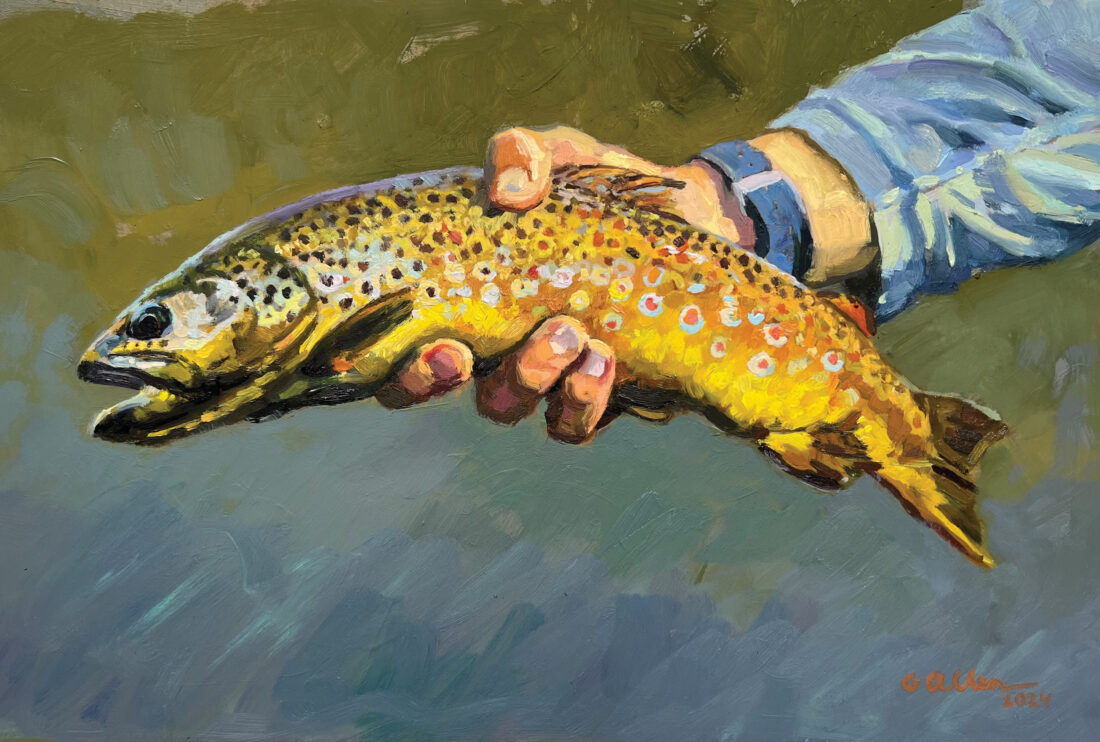I would hazard to say there aren’t many world-class writers who spent their last days hanging off the back of a garbage truck, smelling of “piss and green mayonnaise.” Harry Middleton did. And Middleton, who wrote principally about his life among mountain streams, was a world-class writer. Because he has been nearly forgotten, I want to say that right up front.

I first heard of Harry Middleton from my cousin Tye. Our fathers were brothers, but only my uncle Jerry was a fisherman. He and Tye actually named one of their cats after a famous fly, the Rat Faced McDougall. Uncle Jerry tried to teach me and Tye fly fishing on a Rocky Mountain stream when we were eight. When one of my backcasts set its hook in my uncle’s neck, however, he let out a shriek so unnerving it scared me off the sport for thirty years. But approaching middle age, I decided my life, or at least my leisure, needed a new trajectory. To make up for those lost decades, I took long trips to the Flathead River in Montana, where cutthroat trout are very forgiving to beginners, and I read everything I could about fly fishing by the greats: Izaak Walton, Thomas McGuane, Nick Lyons, Norman Maclean, and others. But Middleton was unknown to me until, while we were casting from canoes on the Cumberland River back in our home state of Kentucky, Tye recommended On the Spine of Time.
Published in 1991, Middleton’s travelogue follows a spiderweb of paths across Great Smoky Mountains National Park, from Abrams Creek on the western boundary to Big Creek at the eastern flank. But travelogue hardly suffices. Though it remains the best book about fly fishing I’ve ever read, it may also be the best book I’ve ever read about how the natural world can build a healing bridge from crushing loneliness to a life rich with elemental experience, if we know where to look. And how to look. While he earned two degrees in textual studies from Louisiana universities, Middleton was unrivaled when it came to reading the real text, the Book of Nature.
Last summer, Tye and I climbed up beyond the day hikers from Bryson City, North Carolina, into the Deep Creek watershed Middleton wrote about in On the Spine of Time. This Tuckasegee River tributary proved for him a “mingling with muscle and nerve, probing endlessly through mind and imagination, as though it were a totem of every trout stream I have known.” Early one morning, we stepped away from our campsite into the skinny shoals of Deep Creek to begin a twelve-hour trek upstream through a narrow sandstone gorge.
“We’re fishing in the footsteps of greatness today,” Tye said as dark clouds cleared. An ovenbird called above the suggestive susurrus of the creek. I took a young brown trout from under a mountain laurel that was dropping its white flowers like tiny circus tents along the banks. Tye was Euro nymphing while I worked a dry-dropper with a 4-weight Winston rod, similar to the one Middleton loved. After cracking his skull on a Deep Creek boulder while wade fishing, Middleton wrote, “Better to risk damage to a thick head full of loose thoughts than a well-made rod, a rod full of luck and loyalty.”

While more than thirteen million people visited the Smokies last year, we encountered no bipedal mammals all day (and consequently not a piece of garbage). But you have to work for this kind of solitude, paying with twisted ankles, pummeled knees, and wet cigarettes. Once when Middleton was fishing this stretch, a sudden storm raised the rampaging water, and with nowhere to go, he had to spend the night high in a tree.
Middleton suffered all his life from what he called the “meat bucket blues,” a lingering depression that sent him reeling after he lost a columnist job at Southern Living magazine and ended up working on “county garbage truck No. 2” in Birmingham until his death in 1993 from a suspected heart attack at forty-three. He published five books in his lifetime, two of which—On the Spine of Time and The Earth Is Enough—are masterpieces of American memoir. The latter recounts a short but formative part of Middleton’s childhood in the Ozarks under the tutelage of his paternal grandfather and uncle—two freethinking, book-loving fly fishermen who set him on his path as both an angler and a writer. But he never shook the blues, though he always wrote obliquely about his personal life. In On the Spine of Time, during a sudden snowstorm, Middleton sat in his tent and wrote out a long inventory of “a life whose shelves are pretty bare.” He listed, among other things: “Children, 2, both boys. Number of fly rods they own, 0. Love found, too little.” The Smokies, however, always offered sanctuary from personal disappointments. “Fortune has been kind to me,” he maintained. “I seem to have a head that thrives on wonder of any kind, no matter how exotic or seemingly insignificant.”
As we worked our way around boulder gardens, Tye and I recounted our favorite passages from the book. It begins beside an open window in a small North Alabama study, where Middleton wrote every night in notebooks he bought by the dozen at the local Piggly Wiggly. Then it leads up through Maryville, Tennessee, where a bad batch of potato salad later leaves him retching in his sleeping bag beside the Oconaluftee River. There, as if in a fever dream, a kind of sibylline apparition hands him a cup of broth. Exie Sopwith, in a threadbare dress and red high-tops, nurses Middleton back to consciousness, at which point the river catches his ear and he rigs up his Winston. Exie, who has never seen a fly rod, is astonished when Middleton lands three rainbow trout with his “piddling woolly-looking bug.” Clearly starving, she quickly cooks the trout over her small fire and devours them, telling Middleton he needs to stick to the broth because of his stomach. Then the ethereal mountain woman directs him on to what she called the blessed waters of Hazel Creek, north of Deep Creek.
On his sojourn through the Smokies, he encounters a cast of characters who seem at once too good to be true and too idiosyncratically believable to be fiction. Along Hazel Creek, Middleton hears “some lunatic mountain balladeer” squeezing out raucous tunes on a bagpipe that sound like “a chicken coop caught up in turmoil and rebellion.” Not long after, he stumbles upon the God-drunk Ambrose Noel, offering hope to passersby in the form of a spin on his wooden prayer wheel. Then there’s Arby Mulligan, phrenologist and itinerant founder of the Owl Creek Gap Church of Universal Harmony, who preaches that every day is an epiphany. Also Rachel Settles, a young grad student traveling alone in search of oral histories with her hyperprotective dog—named Dog. And then, looming largest of all, is Tewksbury, the New York financier who retreats to the Smokies every summer in search of sanity and the big, elusive browns. Tewksbury maintains a constant Falstaffian line of talk while he fishes and professes to Middleton his undying, unrequited love for Carlotta Raynoskva, the woman who tends to his baser afflictions at Manhattan’s Apache Massage Service. “His voice sounded as sad and distant as a trio of violas,” Middleton writes of Tewksbury. And that’s the craftsman’s touch right there: not violins, but something even more meticulously plaintive—violas.
“What is your greatest ambition?” Middleton asks Tewksbury as they cast beside a productive pool.
“To be totally ambitionless,” he answers.
“Give life the benefit of the doubt,” adds Arby Mulligan, “and try not to cause any harm.”
And so it goes as the unlikely trio fish the sacral waters of their unroofed church.
The intense concentration that angling requires—reading the water, tracking a minuscule fly, mending line—forces one to stay focused on the present, absolved of past frustration and future anticipation or anxiety. As Middleton puts it, “Taking a trout in a swift-moving mountain stream seems to erase the division of time. There is only the dance of particles and waves, cycles of energy.” To dwell in that continuous present is to understand “time fully used, felt, experienced completely.” Or to paraphrase what Henry David Thoreau said about fishing his own native pond, one ceases existing and begins to be.
It has become something of a trope in the literature of angling to say that fly fishers are weekend philosophers. Perhaps because camping and fishing are such fundamental experiences, one tends to think very fundamental thoughts in a place like this. Middleton marveled at how the local greenstone compressed over a billion years to form these crenellated mountains, making them the perfect place to conjugate those two great philosophical preoccupations—being and time. Ruminating on the notion that, within the great expanse of the cosmic clock, a human life exists for about ten seconds, Middleton mused, “Just enough time, perhaps, to appreciate that man is, like the atom, a microcosm that embraces, even anticipates, the macrocosm: life drifting with time. Emerging.”
Emerging, yes. I tied an emerger below a yellow caddis fly, since Tye and I had seen a few stone flies alighting on our paper lantern back at camp. My cousin, who is a far better angler than me, urged me up to the head of a small pool just below a fast chute while he fished the tailout. Then, incredibly, both of our rods went taut at once, each weighted with a ten-inch rainbow, descendants of the Salmo gairdneri that were introduced to the Southern Appalachians around the turn of the twentieth century. Middleton maintained that these ’bows, with their signature cinnabar side stripe, can outlive their Homo sapiens predators because “stress and self-esteem and image and things like that mean absolutely nothing to a trout.” But these two wouldn’t. We quickly gutted the fish under a bosk of rhododendron and tucked them into our packs for dinner.

When it came to the actual act of angling, Middleton never wrote about expertise; rather he devoted most of his sumptuous prose to the larger experience of finding oneself at home, at peace, in a mountain stream. Though he marked on an old topo map every place he had landed a large brown, Middleton ventured into the Smokies for more than trophies. “Experience is all,” he wrote. “I am surrounded by it, a sponge of muscle and nerve endings mopping up details and energy.”
Everything—rock, bone, river, blood—is energy, said the pre-Socratic philosophers and the quantum physicists. We’re all swirling masses of it, much more permeable than our fixed notions of self and status would have us believe. To lose oneself in an Appalachian watershed is to lose a great deal of the psychic baggage that weighs us down and too often keeps us tied to the debilitating routine of a living that is not a life. Harry Middleton knew this on a deeply visceral level, and he reminded us of it again and again as he wandered over and around the spines of this challenging and liberating mountain range.
At dusk, trudging through long galleries of stone and bony water, Tye and I finally found a path back up to the Deep Creek Trail. As we circled above the perfect stillness of a lush forest cove, Tye said, “It feels like a cathedral.” He was right; this was the same “eucharistic silence” Middleton praised. Weary but fortified by our own immersion in Deep Creek, we walked back to camp, sheltered in that timeless silence.

A fishing chronicle but so much more, Harry Middleton’s travelogue remains a beloved book in the annals of angling. First published in 1991, two years before his death at forty-three, it serves as a meditation on the power of nature—and a love letter to the Great Smoky Mountains, where he could find a sense of peace even amid his personal struggles. As Middleton wrote, “It’s a look at life, its losses and joys, its tragedies and happinesses, what is lost in a life and what is found.”
Garden & Gun has an affiliate partnership with bookshop.org and may receive a portion of sales when a reader clicks to buy a book.








